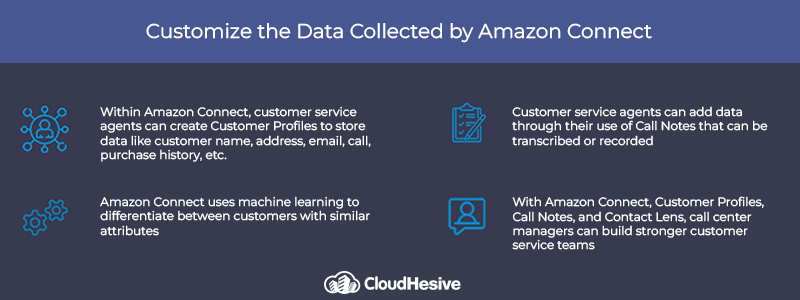Through the Amazon Connect AWS console, admins can customize how data is mapped to a customer profile, create user-defined data attributes, and customize the search keys available to find profiles.

Customer service is not an exact science. When a customer initiates a call or chat session, their question could be simple or complex, their mood good or even hostile. How a customer service agent responds to the customer’s problem is paramount. That will determine if the customer goes away satisfied and, most likely, becomes a repeat customer or never does business with a brand again.
Within Amazon Connect, customer service agents can create Customer Profiles to store data like a customer’s name, address, email, call, purchase history, etc. That information gives call center managers and admins the power to supply customer service agents with the information they need quickly by pulling data from the Amazon Connect AWS console, which is especially important for chatbots driven by AI and machine learning.
In the end, the data stored in Customer Profiles enables a more empowering call or chat experience for the customer service agent and a more personalized and faster response for the customer.
Customer profiles within Amazon Connect
Amazon Connect is a powerful tool for monitoring customer service agents and their interactions with customers. In addition to the tools built into the software, Amazon Connect supports the following third-party applications to retrieve customer data.
- Salesforce
- Zendesk
- ServiceNow
- Marketo
- S3
The other elements that make AWS and Amazon Connect a unique system are that it can run from file servers and web servers and that it can query Oracle, SQL, and other databases. The customer service agent, of course, really sees none of this. What they see is a “unified customer profile” that contains phone numbers, emails, customer IDs, order status, etc. Customer service agents can also read and evaluate other pertinent customer data, such as.
- Number of holds a customer experienced before their issue was addressed.
- Transcripts of what information was exchanged on prior calls.
- Customer sentiment or how the customer felt about the response to the call, maybe even the level of personalization received.
With Customer Profiles, Amazon Connect uses machine learning to differentiate between customers with similar attributes. That means customer service agents can retrieve data on customers that have the same first name and last name by looking at email addresses and phone numbers.
Call notes and Amazon Connect
With the Customer Profiles application within Amazon Connect, customer service managers can give their agents enough information to personalize automated interactions. This can occur during a call or chatbot conversation.
Amazon Connect can store lots of data primarily because of how it utilizes the cloud. That data gets segmented so call centers can bring as much of it as needed into Customer Profiles. Customer service agents then get a “unified profile” so they can provide personalized service.
Customer service agents can add data through their use of Call Notes that can be transcribed or recorded. Contained within those notes might be items to be aware of the next time the customer interacts with the call center or even a way to follow up with a customer after a conversation or chatbot interaction to measure satisfaction levels.
Call notes and Customer Profiles eliminate extra tasks for the call center manager as well. Without a tool like Amazon Connect at their disposal, managers might have to make special requests to software development teams to add profiles that contain customer contact history. Customer Profiles are a sub-application in Amazon Connect and carry no extra charge for managers to access and use.
Contact Lens and machine learning in Amazon Connect
Another sub-application within Amazon Connect is Contact Lens. Powered by the use of machine learning, Contact Lens allows call center managers to further grasp the concerns and moods in customer conversations. They can also see if customers are reacting negatively or positively to the company and its products, and they can track whether customer service agents are adhering to compliance and security when interacting with callers.
With the aid of Amazon Connect and its sub-applications Customer Profiles, Call Notes, and Contact Lens, call center managers can build stronger customer service teams. These tools also allow them to perform the following actions:
- Collect information to train agents.
- Build strategies from what’s learned to improve customer service agents’ responses.
- Enact transcript searches to quickly understand caller issues.
- Receive alerts about problems encountered during customer service agents’ conversations with callers.
- Managers can also eliminate data of a sensitive nature.
- Review options for storage in Amazon Connect.
- Customize what data customer service agents can see.
Most importantly, companies can ascertain how their customers travel through the purchasing journey from beginning to end.
Additional Benefits of Contact Lens
In addition to the abilities listed above, there is additional functionality in Contact Lens. Call center managers can generate data to share with their customer service agents. This data would, most likely, arrive in the “unified profile” agents see while on calls with customers. This data includes
- Powerful analytics to identify keywords and most common words used by Customer Service agents while on calls.
- Customer sentiment scores – how happy or unhappy customers were with the customer service received.
- Analysis of non-talk time.
- Information control in real-time when an agent needs to transfer a call to another agent, so customers do not have to repeat a problem.
- Suppression of customer names, social security numbers, email addresses, and physical addresses from transcripts and recordings. A manager determines who has access to this information.
With Contact Lens and Customer Profiles, call center managers gain access to all the information needed from Amazon Connect. Ultimately, that information assists their customer service agents to deliver personalized and high-quality service to a company’s customers, so they continue on their customer journey.
CloudHesive and Amazon Connect
CloudHesive is a B2B cloud managed services company. We specialize in helping companies transition to the cloud as an Amazon Web Services (AWS) certified consultancy partner. Our goal is to reduce operating costs and increase productivity for companies while deploying cloud security and configuring AWS or other cloud computing operations, especially the use of Amazon Connect for call centers.
With Amazon Connect and its sub-applications Call Notes, Customer Profiles, and Contact Lens, CloudHesive helps companies develop a high-quality, responsive call center. The data stored in the cloud can be customized and delivered quickly to customer service agents, so they can assist customers in a personalized and accurate way that builds brand loyalty.



